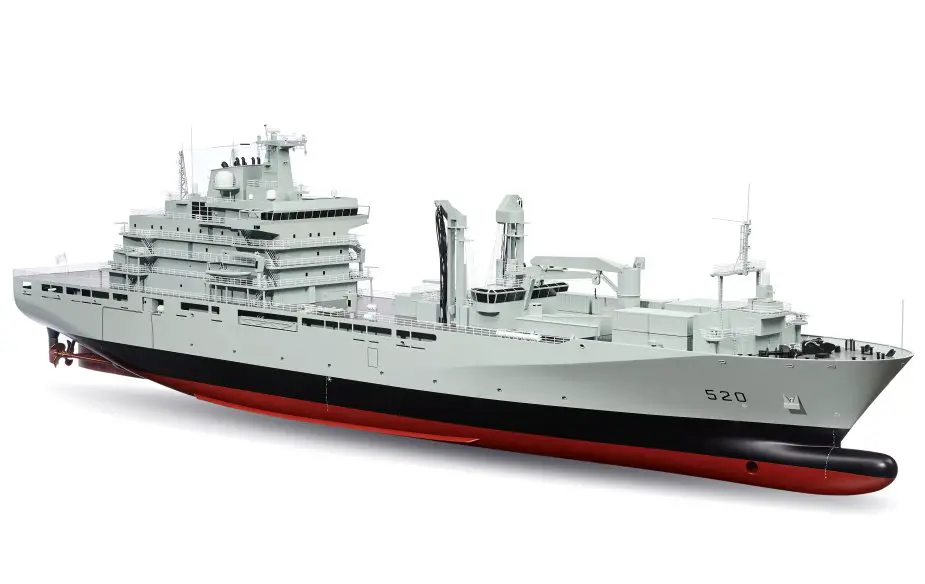Breaking news
Canadianization of the Joint Support Ship.
According to information published by Royal Canadian Navy on March 24, 2021, an adapted version of the German Navy’s Berlin-class auxiliary ship, the new JSS will replace Canada’s now-decommissioned supply ships Protecteur and Preserver. Germany began construction of its fleet of auxiliary ships in the early 2000s, with its third and last ship commissioned into service in 2013.
Follow Navy Recognition on Google News at this link
 An artist rendering of the definition design for Joint Support Ship.
An artist rendering of the definition design for Joint Support Ship.
The Joint Support Ship (JSS) is one of the three classes of ships procured for the Royal Canadian Navy (RCN) under the National Shipbuilding Strategy.
“It’s actually been advantageous for Canada to buy into the Berlin class at this stage, now that Germany has three in the water,” says Rear-Admiral (RAdm) Casper Donovan, Director General Future Ship Capability for the RCN. “We are able to capitalize on many of the lessons learned during previous iterations of the design, and apply those lessons to our Canadian version – the JSS. In other words, even though we are purchasing a mature design, there are necessary modifications required for JSS to meet Canada’s specific environment, needs and standards.”
To support Government of Canada defence policy, the RCN requires a ship that can operate all around the world -- independently, in support of a Canadian Task Group, or integrated into an international coalition force -- and contribute to the full spectrum of military operations. The JSS must be capable of supporting combat operations in the future threat environment, which will require necessary survivability measures and appropriate interoperability with the RCN future fleet and partner navies. It must also be able to support the rapid provision of humanitarian relief, represent Canada through defence diplomacy, and support a broad set Government priorities.
To meet this global requirement, whether JSS is operating in the heat of the Arabian Sea or the cold of Canada’s Arctic waters, the ship itself and all of its systems must be able to handle all extremes of climate and temperature.
Other modifications include the requirement to meet today’s international regulations, such as those regarding limits on engine gas emissions, which have become more stringent since the Berlin class was designed in the 1990s. The JSS will have a more efficient engine design, which will satisfy the RCN’s range and speed needs, but achieve these with new, low-sulfur fuel formulas and exhaust gas scrubbers.
The JSS must be capable of handling multiple CH-148 Cyclones, a large multi-role maritime helicopter with its own unique operational and maintenance requirements. And, while not all of the design changes are large or complex – the ship’s flag had to be moved because the Cyclone sight lines were blocked – all are necessary.
Different military-specific personnel and operational policies also drove some of the modifications. The JSS design uses a gender-neutral approach to crew habitability and washrooms, part of the RCN’s cultural drive towards greater inclusivity. This will include individual shower stalls and toilets with lockable doors, instead of the older style communal showers and urinals. Other design changes integrate the most current technology that will enable the RCN to operate the JSS well into the future.
Another uniquely Canadian event was also used to modify the JSS to Canadian requirements.
“We are also using the hard lessons learned from incidents like the original Her Majesty's Canadian Ship Protecteur engine room fire to modify the design for RCN damage control needs -- be it a fire, flood or need for redundancy to ensure survivability of our sailors,” says RAdm Donovan.
The modifications being incorporated in JSS will give Canada a robust at-sea replenishment and support capability, designed in a manner that meets the RCN’s specific military requirements, and will provide the agility to operate in multiple ways to achieve mission success and support the Canadian government’s needs of today and well into the future.
The Joint Support Ship (JSS) project is a Government of Canada capital acquisition project to replace the Royal Canadian Navy's ageing Auxiliary Oiler Replenishment (AOR) ships. Canada's current procurement strategy includes the assessment/evaluation of two design options: a bespoke design developed by BMT Fleet Technology and an existing, off-the-shelf design of ThyssenKrupp Marine Systems' Berlin Class.


























